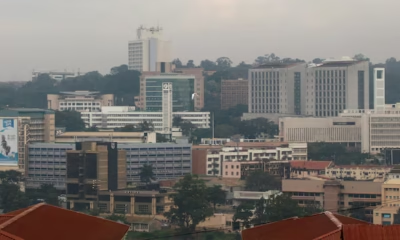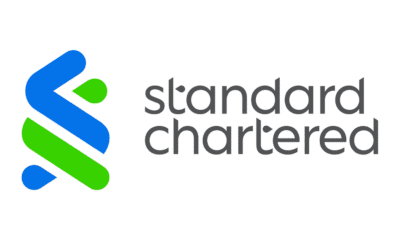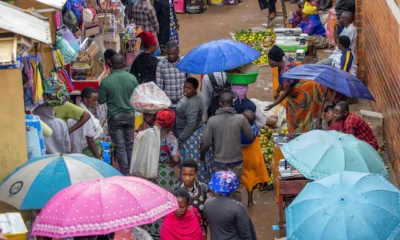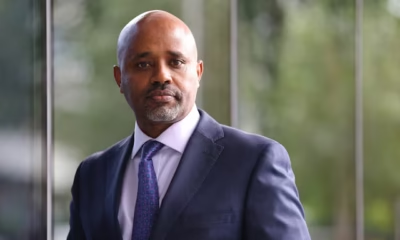Public Finance & Economic Development
Rwanda Tightens Foreign Currency Rules: What Businesses Need to Know
The six-month transition period gives businesses time to comply with the new directive. Companies must either amend existing contracts or seek BNR authorization. The move aims to strengthen the Rwandan Franc and curb unauthorized forex activity.

Rwanda’s National Bank introduces stricter rules for foreign currency transactions. Learn which entities can legally transact, how to comply, and the six-month transition period.
Rwanda Tightens Foreign Currency Rules for Businesses
Kigali, Rwanda — September 24, 2025 — Rwanda is intensifying its efforts to regulate foreign currency transactions. The National Bank of Rwanda (BNR) issued a new directive on September 17, 2025, clarifying which businesses can legally transact in foreign currency and outlining the procedures for others to obtain authorization.
“The directive enhances transparency and safeguards the stability of the Rwandan Franc,” a BNR spokesperson stated.
This move, which aims to curb dollarisation and strengthen the national currency, comes hot on the heels of the authorities here banning foreign currency pricing without formal approval.
Who Can Transact in Foreign Currency?
The directive categorizes businesses into two groups:
- Deemed Authorized Dealers — These include real estate firms with valid investment certificates, tourism operators licensed by the Rwanda Development Board (RDB), and companies operating under the Kigali International Financial Centre (KIFC). They do not need further approval to transact in foreign currencies.
- Non-Authorized Entities — Businesses outside these categories must apply to BNR. The central bank has up to 25 working days to respond, extendable by 10 days. (Ensafrica)
How Non-Authorized Businesses Can Apply
To gain approval, non-authorized entities must submit:
- A board resolution authorizing the application.
- A business incorporation certificate.
- A description of the business model and the need for foreign currency transactions.
- Proof of dealings with non-residents or other qualifying factors.
Approval is valid until revoked by BNR. (Lexology)
Record-Keeping Rules
Authorized businesses must keep records of all foreign currency transactions for 10 years. This ensures accountability and helps BNR monitor compliance. Violations may lead to fines or revocation of authorization. (Ensafrica)
Transition Period
Businesses with existing contracts in foreign currency have six months to comply. They can either apply for authorization or adjust contracts to meet the new requirements. (AllAfrica)
Why This Matters
The directive is expected to:
- Strengthen the Rwandan Franc: Reducing dependence on foreign currencies boosts the national currency.
- Enhance economic stability: Limiting unauthorized transactions reduces financial volatility.
- Promote accountability: Record-keeping ensures businesses operate transparently.
Economists say the rules may also discourage informal forex trade and attract investors seeking a stable financial environment.
Next Steps for Businesses
Companies operating in Rwanda should assess compliance and act quickly. Non-compliant businesses risk penalties or losing the right to transact in foreign currencies. BNR encourages firms to review their status and submit applications promptly.
For official guidance, visit the National Bank of Rwanda.
Related Reading
- BNR Clarifies Who Can Legally Use Foreign Currency
- Understanding Rwanda’s FX Regulations 2025
- Implications of Rwanda’s Currency Restrictions
Public Finance & Economic Development
Uganda Sells $96m in Treasury Bills at 2025 Auction
The Bank of Uganda is tapping short-term securities to bridge its budget deficit. With yields rising, Treasury Bills are drawing local banks, pension funds, and foreign investors. Economists warn, however, that heavy domestic borrowing could crowd out private sector credit.

The Bank of Uganda is auctioning Shs355bn ($96m) in Treasury Bills on Sept 24, 2025, to finance projects, attract investors, and strengthen the economy.
Kampala, Uganda — The Bank of Uganda (BoU) has launched a fresh auction of Shs355 billion ($96 million) in Treasury Bills, offering investors a safe and profitable option while helping finance the country’s development plans. The sale takes place on September 24, 2025, and comes as the government navigates tighter global financing conditions.
The central bank announced that the auction will feature three maturities. These include 91-day bills worth Shs25 billion ($6.8 million), 182-day bills at Shs75 billion ($20.3 million), and 364-day bills totaling Shs255 billion ($68.9 million). The securities are available to both domestic and foreign investors.
“The auction provides a stable investment avenue and supports the country’s broader economic agenda,” the Uganda Broadcasting Corporation reported, quoting BoU officials.
Why the Auction Matters
Uganda faces a budget deficit as spending outpaces revenue. For the fiscal year 2025/26, the government projects Shs31.9 trillion ($8.6 billion) in revenue against expenditures of Shs51.53 trillion ($13.9 billion). Treasury Bills, alongside longer-dated bonds, have become a key tool to bridge the financing gap. In June this year, the government raised $88 million in a rare private placement treasury bond auction.
The BoU has leaned on short-term paper to meet immediate cash needs while ensuring investor confidence. The approach also helps to manage liquidity and keep inflation under control.
According to Kikubo Lane, yields on government securities have recently climbed, reflecting both global pressures and local demand for higher returns.
Investor Appetite and Global Context
Ugandan government paper continues to attract significant interest. Demand has been supported by domestic pension funds, commercial banks, and insurance firms. Foreign portfolio investors have also increased their participation, seeking exposure to frontier African markets with strong growth potential.
Global conditions play a major role. The U.S. Federal Reserve has kept interest rates high, making global financing more expensive. Meanwhile, regional peers such as Kenya and Tanzania face fiscal challenges of their own. As a result, Uganda’s Treasury Bills offer relatively attractive yields for cautious investors.
The IMF has warned that frontier markets like Uganda must carefully manage debt sustainability. With external debt already estimated at $24.5 billion in mid-2025, the balance between borrowing and stability is delicate.
Debt Sustainability in Focus
Uganda’s domestic debt stock has risen as the government turns inward for financing. By issuing more Treasury Bills and bonds, it reduces reliance on costly external loans. This strategy lowers exposure to currency volatility and international credit risks.
However, it also raises the risk of “crowding out” private sector borrowing. Commercial banks often prefer risk-free government securities over lending to businesses. Economists warn that over time, this could dampen credit growth for small and medium-sized enterprises.
Still, the BoU insists that short-term securities remain vital for balancing fiscal needs with monetary stability. In an interview with SoftPower, analysts said the central bank’s discipline has helped maintain investor confidence despite global volatility.
Next Steps for Investors
Investors interested in today’s auction can participate through the Central Securities Depository System operated by BoU. Settlement is typically on a T+1 basis, meaning payment and allocation occur one day after the auction.
Successful bidders will earn interest based on the discount rate offered. The securities are backed by the government, making them among the safest investments available in the local market.
Market participants expect yields to remain elevated, given inflationary pressures and rising domestic borrowing needs. This may provide attractive returns for both institutional and retail investors.
Broader Economic Implications
The auction is more than just a fundraising exercise. It signals Uganda’s determination to sustain growth, manage inflation, and maintain macroeconomic stability.
According to Nile Post, investor interest in government securities has steadily grown in recent years. This has been aided by regulatory reforms and efforts to deepen Uganda’s capital markets.
For the government, the challenge remains balancing short-term borrowing with long-term debt sustainability. With infrastructure and social spending priorities expanding, Treasury Bills will continue to play a central role in bridging funding gaps.
Outlook
Uganda’s latest Treasury Bill auction underlines the delicate balance between funding needs and financial stability. As global markets remain volatile, BoU’s ability to attract investors at favorable rates will be closely watched.
Economists argue that consistent transparency and prudent fiscal management will be key. If managed well, these auctions could strengthen the country’s financial credibility and attract further international investment.
Public Finance & Economic Development
Kenya Pipeline IPO to Raise $1.15B in Landmark Privatization
The Kenya Pipeline IPO marks the first state-owned enterprise listing in over a decade. Proceeds will help the government cut debt and ease reliance on borrowing. Investors see it as a rare chance to buy into strategic infrastructure powering Kenya and its neighbors.

Kenya plans a $1.15B IPO of Kenya Pipeline Co., its largest listing since Safaricom. The IMF-backed sale aims to cut debt and boost the Nairobi bourse.
Kenya’s $1.15 Billion Pipeline IPO Set to Eclipse Safaricom’s Landmark Listing
NAIROBI — Kenya is preparing its biggest-ever initial public offering (IPO), with plans to raise as much as $1.15 billion by selling shares in Kenya Pipeline Company (KPC). The move, announced this week, would mark the first time in more than a decade that the government is offering shares in a state-owned enterprise — and the deal could eclipse the historic 2008 listing of Safaricom Plc, still considered Kenya’s most successful privatization.
The proposed sale of up to 65% of KPC comes as the government intensifies efforts to cut reliance on borrowing and meet reform commitments made to the International Monetary Fund. Lawmakers are expected to vote on the IPO proposal on Tuesday, paving the way for what could become a transformative moment for Nairobi’s capital markets.
IMF-Backed Fiscal Strategy
The IPO is part of broader fiscal reforms agreed between Kenya and the IMF under a multi-billion-dollar support program. The IMF has urged Nairobi to diversify revenue sources and reduce dependence on expensive domestic and external loans.
Kenya’s public debt currently stands at nearly 68% of GDP, up from around 45% a decade ago, according to the National Treasury. Servicing that debt consumes more than half of annual government revenues, leaving little room for development spending.
By partially privatizing KPC, the government hopes to generate a windfall, boost investor confidence, and deepen liquidity at the Nairobi Securities Exchange (NSE).
Bigger Than Safaricom’s IPO
The pipeline operator’s offering could outstrip the Safaricom IPO of 2008, which raised about $770 million and attracted nearly 1 million retail investors, creating a generation of first-time shareholders in Kenya.
Safaricom’s listing not only transformed the NSE but also democratized investing by allowing ordinary Kenyans to buy into a company that later became the country’s largest by market value.
KPC’s IPO, at $1.15 billion, would exceed that milestone by nearly 50%, setting a new benchmark for African privatizations. Analysts say the deal could revive retail investor enthusiasm in a market that has seen few large listings in recent years.
Why KPC Matters
Kenya Pipeline Company is one of the country’s most strategic state-owned assets. It operates the national petroleum pipeline network, transporting fuel from the port of Mombasa to inland depots, including those in Nairobi, Kisumu, and Eldoret.
The company’s infrastructure underpins Kenya’s economy and also supports the fuel needs of landlocked neighbors such as Uganda, Rwanda, and South Sudan.
By floating a majority stake, the government hopes to modernize the company, attract new capital for infrastructure upgrades, and unlock efficiencies in the petroleum supply chain.
Risks and Investor Questions
Despite the strong headline numbers, questions remain over valuation, governance, and investor appetite.
Some analysts warn that global investors may hesitate given Kenya’s fiscal challenges and currency volatility. The Kenyan shilling has depreciated more than 20% against the US dollar over the past three years, eroding returns for foreign investors.
Others point to governance risks. State-owned enterprises in Kenya have often faced allegations of inefficiency and political interference, making transparency a key factor in attracting buyers.
Still, proponents argue that the KPC IPO could be a turning point. “This is not just about raising money; it’s about signaling seriousness in reform and market development,” said a Nairobi-based investment banker.
Regional and Global Context
Kenya’s planned IPO stands out at a time when global equity markets remain volatile and African capital markets have struggled to attract big-ticket listings.
Neighboring Uganda shelved a planned IPO of its state oil firm in 2023, while Nigeria has relied more heavily on debt than equity markets to finance its budget.
If successful, Kenya’s offering could reignite interest in African privatizations, especially at a time when foreign investors are looking for exposure to frontier markets with long-term growth potential.
Political Implications
The IPO is also politically sensitive. President William Ruto’s administration faces public pressure over high living costs and rising taxes, and critics may view the sale of strategic assets as a short-term fix.
Parliament’s approval will be a critical test, with some lawmakers wary of foreign investors taking control of vital energy infrastructure. The government has hinted it may ring-fence a portion of shares for local investors, following the Safaricom model.
What Comes Next
If parliament gives the green light, the Treasury will appoint transaction advisors and begin preparing the offering documents. The IPO could launch in the second half of 2026, depending on market conditions.
For investors, the deal offers a rare chance to buy into a critical East African infrastructure asset. For Kenya, it represents a gamble — trading partial ownership of a strategic pipeline for financial stability and renewed investor confidence.
Whether it succeeds will depend not just on valuation, but also on execution, transparency, and the government’s ability to balance reform with public trust.
Public Finance & Economic Development
Uganda’s Debt Surge 2025: Domestic Borrowing and Economic Impact
Rising interest costs and a growing debt-to-GDP ratio are raising concerns among economists. They warn the trend could limit future public spending on key services.

Uganda’s debt jumps 26% in 2024/25, driven by domestic borrowing. Learn how fiscal policy, infrastructure spending, and international funding shape economic stability.
Uganda’s Debt Surge: Political Choices, Economic Consequences
Debt Jumps 26% in 2024/25
KAMPALA — Uganda’s public debt surged 26% in the 2024/2025 financial year, climbing from $25.6 billion to $32.3 billion. This sharp increase is largely due to a 52.7% rise in domestic borrowing, as the government sought to finance ambitious infrastructure projects under President Yoweri Museveni. External borrowing, by comparison, grew only modestly at 6.2%.
Economists and central bank officials warn that rising debt service costs are putting pressure on funding for essential sectors such as education, healthcare, and social protection. The heavier reliance on domestic borrowing has led to higher debt service expenses, as local lenders demand higher yields. Consequently, Uganda’s debt-to-GDP ratio climbed to 51.3%, up from 46.9% the previous year, when public debt surged by 9% to 107 T.
Domestic Debt and Political Context
The rise in domestic debt coincides with the passage of the Anti-Homosexuality Act in May 2023, which imposed life imprisonment and, in certain cases, the death penalty for “aggravated homosexuality.” The law triggered an international backlash: the World Bank and other lenders suspended new loans, cutting Uganda off from cheaper foreign financing.
After nearly two years, the World Bank resumed funding in June 2025, approving three major projects focusing on social protection, education, and support for displaced persons and refugees. Safeguards were included to prevent discrimination against LGBTQ individuals. These initiatives are expected to inject hundreds of millions of dollars into Uganda’s economy, offering relief to sectors hardest hit by the previous funding freeze.
Plans to Curb Domestic Borrowing
The government aims to reduce domestic borrowing by 21.1% and trim public spending by 4.1% in the 2026/27 fiscal year. The proposed budget totals 69.4 trillion Ugandan shillings ($19.9 billion), down from 72.4 trillion shillings the previous year. Officials argue that these steps are essential to maintain fiscal sustainability and to lower the proportion of revenue spent on debt interest.
Economists warn that continued high domestic borrowing could crowd out private sector lending, raise interest rates, and slow economic growth. “The government’s borrowing strategy is pushing up local yields, which could discourage private investment and hamper economic expansion,” said a Kampala-based financial analyst.
Infrastructure Projects Depend on Local Debt
Uganda’s ambitious infrastructure agenda—including roads, energy, and urban development—remains heavily reliant on domestic financing. With local interest rates higher than those for external debt, servicing costs have increased, limiting funds available for education, healthcare, and social protection.
This scenario highlights the delicate balance between domestic fiscal policy and international relations. While World Bank funding provides some relief, domestic borrowing continues to dominate Uganda’s fiscal strategy.
Adopting Blended Financing Approaches
To ease pressure on domestic debt, the government plans to attract commercial loans from international banks. These large loans are intended to support priority sectors without significantly raising interest costs, signaling a move toward blended financing that combines domestic and international sources.
Such strategies are particularly relevant for renewable energy projects and urban infrastructure. By leveraging commercial loans alongside development funding, Uganda seeks to bridge financing gaps while maintaining fiscal stability.
Long-Term Economic Risks
Despite these measures, Uganda faces challenges in balancing economic growth with debt sustainability. Rising domestic borrowing, coupled with higher interest rates, could constrain fiscal flexibility. Experts warn that without strong debt management, diversified financing sources, and policies encouraging private sector participation, long-term stability may remain fragile.
“The key for Uganda is not only controlling the debt stock but ensuring that borrowed funds generate productive returns that stimulate growth,” said a senior economist at a Kampala-based think tank.
International Implications
Uganda’s experience underscores how domestic policy decisions can influence international financing. The temporary halt in foreign loans following the Anti-Homosexuality Act illustrated the economic consequences of politically sensitive legislation. The World Bank’s eventual resumption of funding demonstrates cautious re-engagement, contingent on adherence to anti-discrimination safeguards.
Analysts emphasize that careful debt management, alongside reforms in revenue collection and targeted public spending, will be vital to sustaining economic stability and maintaining investor confidence.
-

 Public Finance & Economic Development5 days ago
Public Finance & Economic Development5 days agoUganda’s Debt Surge 2025: Domestic Borrowing and Economic Impact
-

 Banking, Finance & Economic Policy6 days ago
Banking, Finance & Economic Policy6 days agoStanChart Faces Fresh Pension Fight as 325 Ex-Employees File New Claims in Kenya
-

 Public Finance & Economic Development6 days ago
Public Finance & Economic Development6 days agoRwanda Economic Growth Slows to 7.8% in Q2 2025 Amid Industrial and Services Sector Challenges
-

 Banking, Finance & Economic Policy7 days ago
Banking, Finance & Economic Policy7 days agoHow Gideon Muriuki’s Leadership Turned Co-operative Bank of Kenya Into a $6.25 Billion Powerhouse
-

 Banking, Finance & Economic Policy5 days ago
Banking, Finance & Economic Policy5 days agoEyob Tekalign Named Ethiopia Central Bank Governor
-

 Banking, Finance & Economic Policy7 days ago
Banking, Finance & Economic Policy7 days agoDavid Hodnett Takes Helm at Standard Bank as CEO Amid Global Challenges
-

 Celebrities, Creatives & Public Figures5 days ago
Celebrities, Creatives & Public Figures5 days agoShamil Wamala: Ugandan TikTok Star Turning Social Media Hustle Into Global Influence
-

 Regional Security & Peacebuilding5 days ago
Regional Security & Peacebuilding5 days agoCongo Conflict Escalates: M23 Rebel Parade in Goma and Army Reinforcements Threaten Fragile Peace










